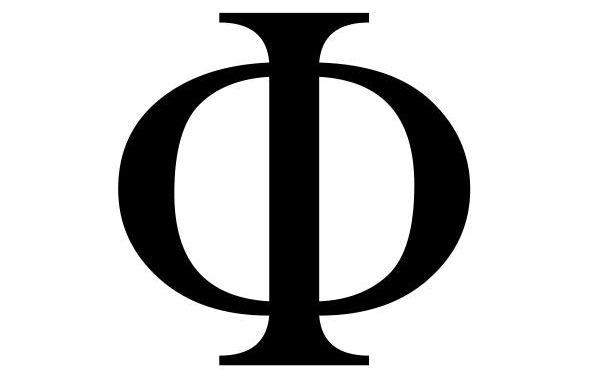Phi Kappa Psi - Keeping Information Secure
When groups come together, whether for friendship, learning, or a shared purpose, there is often a need to share details, some of which might be quite personal or private. This holds true for any association, including those with a long history and a strong sense of community, such as a group like Phi Kappa Psi. Safeguarding these kinds of details, making sure they stay with the people who should see them, is a very important part of keeping trust and ensuring everyone feels comfortable. You know, it's about making sure that what's meant to be kept close, stays close.
The information we pass around comes in many different forms, too it's almost like a puzzle with pieces of various shapes and sizes. Sometimes it is a quick chat, other times it is a formal document. Some details might be very clear, while others are a bit more hidden, perhaps within a conversation or a casual note. Knowing where these details are, and what they look like, helps us figure out the best ways to keep them safe. It is, in a way, about recognizing all the places sensitive details might live.
Rules and common sense guidance exist for a good reason; they help us handle these sensitive bits of information with the care they deserve. These guidelines are not just for big businesses or government bodies; they offer helpful lessons for any group that values its members' privacy and the integrity of its shared knowledge. We will look at some general ideas about keeping information safe, which, for instance, could be quite helpful for a group like Phi Kappa Psi, or really, any community where trust matters.
Table of Contents
- What is "Phi" in the context of "Phi Kappa Psi"?
- How does the Greek letter 'phi' connect to Phi Kappa Psi?
- Why is protecting sensitive details important for any group?
- Understanding how information moves within Phi Kappa Psi
- What happens when rules about information are not followed?
- Avoiding issues for Phi Kappa Psi
- How can individuals manage their own data?
- Personal control for members of Phi Kappa Psi
What is "Phi" in the context of "Phi Kappa Psi"?
The word "Phi" itself carries a few different meanings depending on where you see it. For some, it might bring to mind the Greek letter, written as φ. This small Greek letter phi is a symbol with its own unique place in written language. It has a specific code, U+03C6, in the system that computers use to show letters and symbols from all over the world. This means that, basically, it is treated like any other letter, used to put together Greek words. Its status is similar to how we use letters in our own alphabet. So, that is one way to think about "phi."
However, when you hear "Phi" in other discussions, particularly those about private details, it can mean something else entirely. It often refers to Protected Health Information, or PHI for short. This kind of information is about someone's health, their care, or even how they pay for that care. It is information that, for instance, needs very careful handling because it is so personal. This "PHI" can show up in many different kinds of records and in various ways within a place that handles such details. It could be in a doctor's notes, or in a bill from a hospital, or even in a brief message about someone's well-being. It is just a different kind of "phi," you know?
So, when we talk about "Phi Kappa Psi," the "Phi" part of the name refers to the Greek letter, which is part of a tradition of using Greek letters for organizational names. It does not mean the group handles medical records. But the presence of "Phi" in the name can remind us that any group, including one like Phi Kappa Psi, will have its own sensitive details that need protection, even if they are not medical in nature. This could be anything from member contact information to internal discussions or plans. In fact, the idea of protecting any kind of sensitive "phi" is a good one for everyone to consider.
How does the Greek letter 'phi' connect to Phi Kappa Psi?
The connection between the Greek letter 'phi' and the name 'Phi Kappa Psi' is, quite simply, that the letter is part of the name. Many organizations, especially those with historical roots, choose names that include Greek letters. This choice often symbolizes certain values, principles, or a shared heritage that the group holds dear. The letter 'phi' itself, as a symbol, carries various meanings in different fields, from mathematics to philosophy, suggesting concepts like the golden ratio or balance. So, when it appears in a name like Phi Kappa Psi, it could be seen as representing some of those deeper ideas that form the group's foundation. It is, basically, a visual and symbolic part of their identity.
This symbolic use of the letter 'phi' in the name of Phi Kappa Psi, however, is distinct from the concept of Protected Health Information (PHI) that we find in discussions about data security. While both use the term "phi," their meanings are quite separate. One is a part of an organization's chosen title, a nod to tradition and shared ideals. The other is a specific type of personal data that needs legal protection, usually related to health services. It is important to keep these two uses clear in our thoughts, as a matter of fact.
Yet, the very presence of the word "phi" in the name of Phi Kappa Psi can serve as a gentle reminder. It can make us think about the importance of safeguarding *any* kind of information that is considered personal or private, regardless of whether it is health-related or not. Just as a specific Greek letter holds meaning for a group, the private details of its members or its internal workings also hold great meaning and deserve careful handling. So, in a way, the name itself subtly brings up the idea of protection.
Why is protecting sensitive details important for any group?
Protecting sensitive details is a cornerstone of trust for any group, big or small. When people share information, they expect it to be kept safe and used only for its intended purpose. If sensitive details are not protected, it can lead to a breakdown in that trust, making members hesitant to share or participate fully. This can, you know, really hurt the feeling of community. It is about ensuring that what is shared within the group stays within the group, or at least only goes to those who have a good reason to see it.
Beyond trust, there are often practical consequences for failing to protect information. For some types of data, like the Protected Health Information mentioned earlier, there are legal requirements and potential penalties for not following the rules. While a group like Phi Kappa Psi might not deal with medical PHI, the principle holds true for other kinds of sensitive data, such as personal contact details, financial contributions, or internal discussions that are meant to be private. A failure to keep these safe could lead to various kinds of issues, from discomfort among members to more serious problems. It is, basically, about being responsible.
The importance of using secure methods for sharing sensitive information cannot be overstated. The suggestion to "Share sensitive information only on official, secure websites" is a good piece of general advice for everyone. This means using platforms or methods that have security measures built in, rather than just sending private details through less secure channels. It is about being thoughtful about how and where information is shared, ensuring that digital spaces, for example, offer a good level of protection against unwanted eyes.
Understanding how information moves within Phi Kappa Psi
Within any group, including Phi Kappa Psi, information moves in many ways and takes on a variety of forms. It might be in a very organized format, like a list of members with their contact numbers, perhaps kept in a spreadsheet or a simple database. This kind of information, which is very structured, is often found in places like billing records, where every piece of data has its own clear spot. It is, in a way, easy to see and manage.
However, information also exists in less organized ways. It could be in emails, casual notes, conversations, or even shared documents that are not part of a formal system. This means that sensitive details for Phi Kappa Psi might be found in many different places, not just in one central spot. This variety of forms and places means that protecting information requires a broad approach, considering all the ways it might be stored or communicated. So, one has to be quite aware of all these different homes for data.
Understanding these different ways information can exist is a first step toward keeping it safe. If you know where sensitive details are, whether they are in a structured table or a casual chat log, you can then think about how best to protect them. This awareness is important for any group, as it helps in putting sensible safeguards in place. It is really about having a good grasp of the whole picture of information flow within Phi Kappa Psi.
What happens when rules about information are not followed?
When rules about information are not followed, there can be a range of outcomes, some of which are quite serious. For organizations that handle highly sensitive data, like health information, a failure to follow security rules can lead to investigations and even financial penalties. We see this with the Department of Health and Human Services (HHS), Office for Civil Rights, which looks into potential security rule failures. These investigations can sometimes end in a settlement, which means an agreement is reached to fix the issues and often involves paying a sum of money. This, you know, shows how serious it can be.
One particular concern highlighted in the source material is the risk of issues caused by a "malicious insider." This refers to someone within an organization who intentionally tries to exploit weaknesses in security rules to get at sensitive information. This kind of threat is especially tricky because the person already has some level of access or trust. It underscores the idea that security is not just about external threats, but also about internal controls and fostering an environment where sensitive details are respected by everyone. It is, in fact, a very real challenge for many groups.
However, it is worth noting that a penalty might not always be imposed for violations in certain circumstances. This suggests there can be situations where, perhaps, an accidental mistake is made, or an issue is quickly corrected, which might lead to a different outcome than a severe punishment. This does not mean that rules are not important, but rather that there can be some room for judgment depending on the specific situation. Still, the general idea is that breaking these rules can lead to problems, so it is usually best to stick to them.
Avoiding issues for Phi Kappa Psi
For a group like Phi Kappa Psi, avoiding issues related to sensitive information involves a clear understanding of what needs protection and how to protect it. While the specific rules like HIPAA apply to health information, the general principles are useful for any organization. These principles include having clear guidelines for handling private details, ensuring that members understand these guidelines, and using secure methods for communication and storage. It is, basically, about building a culture of carefulness.
One key element is to consider who has access to what information and why. Just as security rules aim to prevent "malicious insiders," a group like Phi Kappa Psi can benefit from thinking about internal access controls. This means limiting who can see certain sensitive details to only those who absolutely need to. It is also about fostering a sense of responsibility among all members regarding the privacy of others. This kind of internal vigilance can really help to prevent problems before they even start, you know?
Another important step is to learn from the experiences of others. Even though the examples from the source text are about health information, the lessons about data breaches and the need for strong security are universal. By being proactive and putting good practices in place, Phi Kappa Psi can work to keep its own sensitive information safe and avoid potential difficulties that might arise from mishandling private details. It is, in some respects, about being prepared.
How can individuals manage their own data?
Individuals have a significant role in managing their own data, especially when it comes to highly personal information. The Health Insurance Portability and Accountability Act of 1996 (HIPAA) Security Rule, for example, lays out important requirements for how certain health information should be handled. A key part of this is the idea of authorization. This guidance explains certain requirements for an authorization to use or disclose specific private details for future uses, like research. It means that, usually, your permission is needed before your personal health information can be shared for purposes beyond your immediate care. So, you have a say.
Beyond just giving permission, individuals also have the right to change their minds. The guidance also clarifies aspects of the individual’s right to revoke an authorization. This means that if you initially gave permission for your information to be used or shared in a certain way, you can later take that permission back. This is a very important part of personal control over your own details. It gives people the ability to manage their information as their circumstances or preferences change, which is, honestly, a fundamental right.
These principles of authorization and the right to revoke are not just for health information; they offer a good framework for how individuals can think about any personal details they share. Whether it is signing up for a new service, joining a group, or sharing personal stories, understanding when your permission is needed and that you can withdraw it gives you more control. It is about being an active participant in how your personal information is handled, rather than a passive one. You know, it is about empowerment.
Personal control for members of Phi Kappa Psi
For members of Phi Kappa Psi, the idea of personal control over one's own data is just as relevant, even if the specific rules are different from those for health information. Members share various personal details with the group, from contact information to perhaps preferences or experiences. The principles of authorization and the ability to revoke that authorization can

Greek alphabet, letters and symbol

Java : Understanding The Golden Ration Phi | by A Passionate Programmer

Phi: The Golden Ratio | Live Science